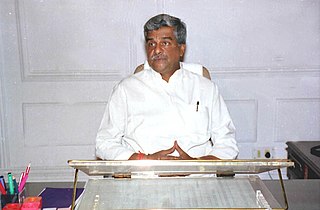Related Research Articles

Coal is a combustible black or brownish-black sedimentary rock, formed as rock strata called coal seams. Coal is mostly carbon with variable amounts of other elements, chiefly hydrogen, sulfur, oxygen, and nitrogen. Coal is a type of fossil fuel, formed when dead plant matter decays into peat and is converted into coal by the heat and pressure of deep burial over millions of years. Vast deposits of coal originate in former wetlands called coal forests that covered much of the Earth's tropical land areas during the late Carboniferous (Pennsylvanian) and Permian times. Many significant coal deposits are younger than this and originate from the Mesozoic and Cenozoic eras.

Bituminous coal, or black coal, is a type of coal containing a tar-like substance called bitumen or asphalt. Its coloration can be black or sometimes dark brown; often there are well-defined bands of bright and dull material within the seams. It is typically hard but friable. Its quality is ranked higher than lignite and sub-bituminous coal, but lesser than anthracite. It is the most abundant rank of coal, with deposits found around the world, often in rocks of Carboniferous age. Bituminous coal is formed from sub-bituminous coal that is buried deeply enough to be heated to 85 °C (185 °F) or higher.

Anthracite, also known as hard coal and black coal, is a hard, compact variety of coal that has a submetallic lustre. It has the highest carbon content, the fewest impurities, and the highest energy density of all types of coal and is the highest ranking of coals.

Coal mining is the process of extracting coal from the ground or from a mine. Coal is valued for its energy content and since the 1880s has been widely used to generate electricity. Steel and cement industries use coal as a fuel for extraction of iron from iron ore and for cement production. In the United Kingdom and South Africa, a coal mine and its structures are a colliery, a coal mine is called a 'pit', and the above-ground structures are a 'pit head'. In Australia, "colliery" generally refers to an underground coal mine.

The Ludlow Massacre was a mass killing perpetrated by anti-striker militia during the Colorado Coalfield War. Soldiers from the Colorado National Guard and private guards employed by Colorado Fuel and Iron Company (CF&I) attacked a tent colony of roughly 1,200 striking coal miners and their families in Ludlow, Colorado, on April 20, 1914. Approximately 21 people, including miners' wives and children, were killed. John D. Rockefeller Jr., a part-owner of CF&I who had recently appeared before a United States congressional hearing on the strikes, was widely blamed for having orchestrated the massacre.

The National Coal Board (NCB) was the statutory corporation created to run the nationalised coal mining industry in the United Kingdom. Set up under the Coal Industry Nationalisation Act 1946, it took over the United Kingdom's collieries on "vesting day", 1 January 1947. In 1987, the NCB was renamed the British Coal Corporation, and its assets were subsequently privatised.

Fly ash, flue ash, coal ash, or pulverised fuel ash – plurale tantum: coal combustion residuals (CCRs) – is a coal combustion product that is composed of the particulates that are driven out of coal-fired boilers together with the flue gases. Ash that falls to the bottom of the boiler's combustion chamber is called bottom ash. In modern coal-fired power plants, fly ash is generally captured by electrostatic precipitators or other particle filtration equipment before the flue gases reach the chimneys. Together with bottom ash removed from the bottom of the boiler, it is known as coal ash.

India is the third largest producer of electricity in the world. During the fiscal year (FY) 2021–22, the total electricity generation in the country was 1,719 TWh, of which 1,484 TWh was generated by utilities.

The Illinois and Midland Railroad is a railroad in the U.S. state of Illinois, serving Peoria, Springfield and Taylorville. Until 1996, when Genesee & Wyoming Inc. bought it, the company was named the Chicago and Illinois Midland Railway. It was once a Class I railroad, specializing in the hauling of coal. At the end of 1970 it operated 121 route-miles on 214 miles of track; it reported 255 million ton-miles of revenue freight that year.

Black lung disease (BLD), also known as coal workers' pneumoconiosis, or simply black lung, is an occupational type of pneumoconiosis caused by long-term inhalation and deposition of coal dust in the lungs and the consequent lung tissue's reaction to its presence. It is common in coal miners and others who work with coal. It is similar to both silicosis from inhaling silica dust and asbestosis from inhaling asbestos dust. Inhaled coal dust progressively builds up in the lungs and leads to inflammation, fibrosis, and in worse cases, necrosis.

Coal India Limited (CIL) is an Indian central public sector undertaking under the ownership of the Ministry of Coal, Government of India. It is headquartered at Kolkata. It is the largest government-owned-coal-producer in the world. It is also the seventh largest employer in India with nearly 272,000 employees.

Eraring Power Station is a coal-fired power station consisting of four 720 MW Toshiba steam driven turbo-alternators for a combined capacity of 2,880 MW. The station is located near the township of Dora Creek, on the western shore of Lake Macquarie, New South Wales, Australia and is owned and operated by Origin Energy. It is Australia's largest power station. The plant has two smokestacks rising 200 m (656 ft) in height. It is slated for closure by mid-2025.

Sriprakash Jaiswal, also written Shriprakash or Sri Prakash, is an Indian politician. He served as a member of Parliament for the Indian National Congress and as Minister of State for Home Affairs. He also held ministry of coal for three years, 2011–2014.

A coal-fired power station or coal power plant is a thermal power station which burns coal to generate electricity. Worldwide there are over 2,400 coal-fired power stations, totaling over 2,000 gigawatts capacity. They generate about a third of the world's electricity, but cause many illnesses and the most early deaths, mainly from air pollution.

China is the largest producer and consumer of coal and the largest user of coal-generated electricity in the world. The share of coal in the Chinese energy mix declined to 55% in 2021 according to the US Energy Information Agency.

The Coal Authority is a non-departmental public body of the United Kingdom government sponsored by the Department for Energy Security and Net Zero (DESNZ). On behalf of the country, it owns the vast majority of unworked coal in Great Britain, as well as former coal mines, and undertakes a range of functions including:

Central Coalfields Limited (CCL) is a subsidiary of Coal India Limited (CIL), an undertaking of the Government of India. CCL was established in 1956 as National Coal Development Corporation Limited and is a Category-I Mini Ratna company since October 2007. CCL manages the nationalized coal mines of the Coal Mines Authority, Central division. CCL is headquartered at Darbhanga House, Ranchi, Jharkhand.

Energy consumption per person in Turkey is similar to the world average, and over 85 percent is from fossil fuels. From 1990 to 2017 annual primary energy supply tripled, but then remained constant to 2019. In 2019, Turkey's primary energy supply included around 30 percent oil, 30 percent coal, and 25 percent gas. These fossil fuels contribute to Turkey's air pollution and its above average greenhouse gas emissions. Turkey mines its own lignite but imports three-quarters of its energy, including half the coal and almost all the oil and gas it requires, and its energy policy prioritises reducing imports.
The Coal allocation scam, dubbed in media as Coalgate, is a major political scandal concerning the Indian government's allocation of the nation's coal deposits to public sector enterprise (PSEs) and private companies. In a draft report issued in March 2012, the Comptroller and Auditor General of India (CAG) office accused the Government of India of allocating coal blocks in an inefficient manner during the period 2004–2009. Over the Summer of 2012, resulting in a Central Bureau of Investigation probe into whether the allocation of the coal blocks was in fact influenced by corruption.
References
- ↑ Fergana News Report
- ↑ CEC Archived 2011-07-22 at the Wayback Machine
- ↑ BBC Monitoring report